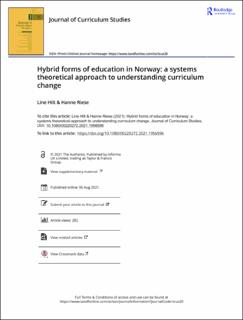Hybrid forms of education in Norway: a systems theoretical approach to understanding curriculum change
Journal article, Peer reviewed
Published version

View/
Date
2021Metadata
Show full item recordCollections
- Department of Education [296]
- Registrations from Cristin [9489]
Abstract
Some might fear that the local flavours of education will evaporate when encountering the hegemony of global, cognitive standards of the knowledge economy. This paper, however, shows that the evolution of curriculum can emerge in surprising directions, creating hybrid forms of education. We will investigate forms of meaning that emerge in Norwegian curriculum in the timespan 1988-2020, and show how systems theory can contribute to studying curriculum changes in a temporal perspective. The empirical case for investigation, is a diverse range of material, documenting curriculum changes in the mentioned period. Concepts from the late Luhmann’s 'theory of distinctions’ will thus be used to give meaning to the emergence of school reforms in Norway. The paper shows that Norwegian policy makers use increasingly complex deparadoxification strategies to deal with an uncertain future, conceptualized as externalization, oscillation, asymmetrisation, and internalization (re-entry). This is most pertinently demonstrated in the latest Norwegian reform LK20, in which a new, hybrid, 'temporal' construct of education, called “new-old-curriculum” or 'competence-Bildung’ emerges. We thus contribute to the field of curriculum studies by observing how changing observations of the past and future fuel and legitimize the evolution of new reforms.
